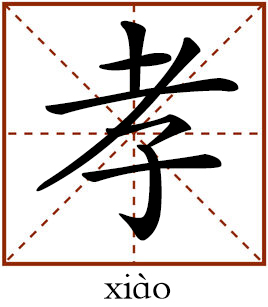Filial Piety

This character refers to filial piety, an important traditional moral in China. Due to the global trend of aging populations, greater attention is being focused on the issue of the care of elders and its relevance to filial practices. Although filial practices are changing with time, love towards parents and families remains the same.
诗歌中的孝
shī gē zhōng de xiào
Shige means poetry and xiao refers to filial piety. Filial piety has always been an important theme of Chinese poetry. This section will introduce a classic Chinese poem on filial piety, A Journeyer’s Song, or Youzi Yin by the Tang poet Meng Jiao (751–814).
“Through a kind mother’s hands passed the thread/ That made the clothes I journeying wear./ Tightly tightly she wove them then,/ Dreading year after year of no return./ Can the young grass ever repay/ The spring sun’s kindly rays?” (trans. Zhang Tingshen, Wei Bosi). At the beginning of the poem, the thread in the mother’s hands and the clothes that the author wears imply that all he wears is made by his mother, representing a close mother-child relationship. The middle lines portray how his mother works hard to prepare clothes for her son before he leaves. She does the needlework meticulously because of the worry that her son’s journey will be long and therefore forcing him to wear his clothes for a long time. The last part of the poem is a metaphor, comparing the mother-child relationship to the relationship between grass and the sunshine in spring. It is the warm sunshine in spring that helps grass grow. The author indicates that the great love that children receive from their parents is a debt that can never be repaid.
Meng Jiao was born in a poor family. His mother experienced various hardships to support his schooling. When he was going to travel far to take the imperial exam, his mother sat all night to make clothes for him. Unluckily, Meng failed the exam again and again. He spent years wandering and preparing for the exam. Finally, he past it and got a position in the government at age 50. After he invited his mother to live together so he could take care of her, he recalled the night in which his mother made clothes for him, and he shed tears for the delayed reciprocation of his mother’s love.
edited by REN GUANHONG

 PRINT
PRINT CLOSE
CLOSE